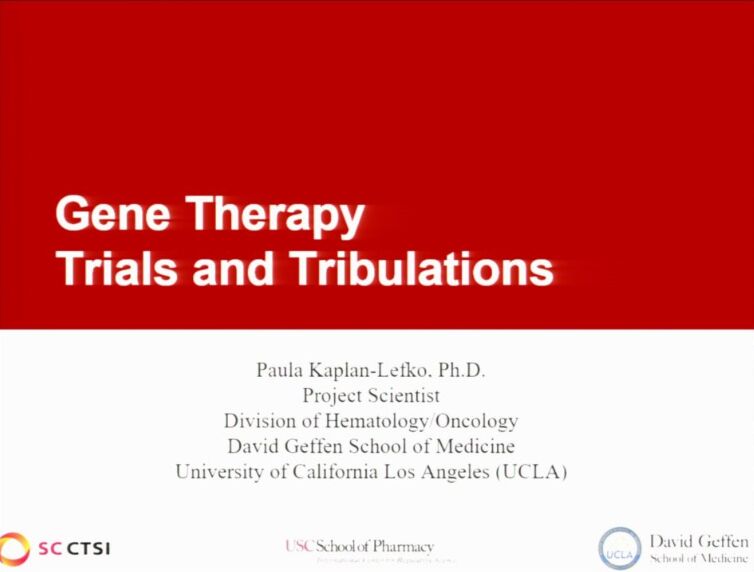Definition of Gene Therapy:
- Medical intervention based on modification of genetic material of living cells
- Ex vivo for subsequent administration to humans
- In vivo by delivery directly into subject
Overview of Gene Therapy Procedure:
- Collect cells
- Gene Modify Cells
- Conditioning Chemotherapy
- Re-administer Cells
- Monitor patient for adverse events
Gene Therapy to Correct Genetic Deficiency:
- Gene therapy is used to treat Severe Combined Immune Deficiency (SCID)
Gene Therapy to Activate the Immune System to Attack Cancer:
- Modify immune cells to kill cancer cells
- Adoptive Cell Therapy (ACT) Clinical Trial Schematic
Coordination of Teams Required for Administration of Gene Modified Cells:
- Manufacturing Team
- Quality Assurance Team
- Manufacturing Team
- Physicians and Nurses
Adverse Events Monitoring Following Cell Administration:
- Local – IRB, ISPRC, DSMB, IBC
- Federal – FDA CBER/OTAT, NIH/RAC
- Protocol changes
- Agreements among regulatory bodies
- SAE attributions can be unclear and can change as information becomes available
Potential Serious Adverse Events Lessons From History
- Death of Jesse Gelsinger (1999)
- X-SCID Patients Developed Leukemia Following Gene Therapy Due to Insertional Mutagenesis (2002)
Risk Assessment for Insertional Mutagenesis Now Required:
- Preclinical risk assessment of new vectors
- Monitoring included in trials for assessment of gene insertions and early detection of secondary malignancies
- Long-term follow up required for gene therapy patients
- Vectors have been modified to decrease the risk of insertional mutagenesis leading to cancer
Additional Testing Required by FDA:
- Replication Competent Retrovirus (RCR) testing
- Replication Competent Lentivirus (RCL) testing
- Virus tested before introduced into cells
- Manufactured cells banked for testing before administration
- Subjects’ blood banked for testing at 3, 6 and 12 months post cell administration and annually thereafter
Three Companies Fought for First Approval of Chimeric Antigen Receptor T (CAR-T) Cell Therapy:
- Novartis
- Juno Therapeutics
- Kite Pharma
New Directions in Gene Therapy
- “Off the shelf” CAR-T cells
- Safety switches – turn off genes or kill cells
- Reduce cost

